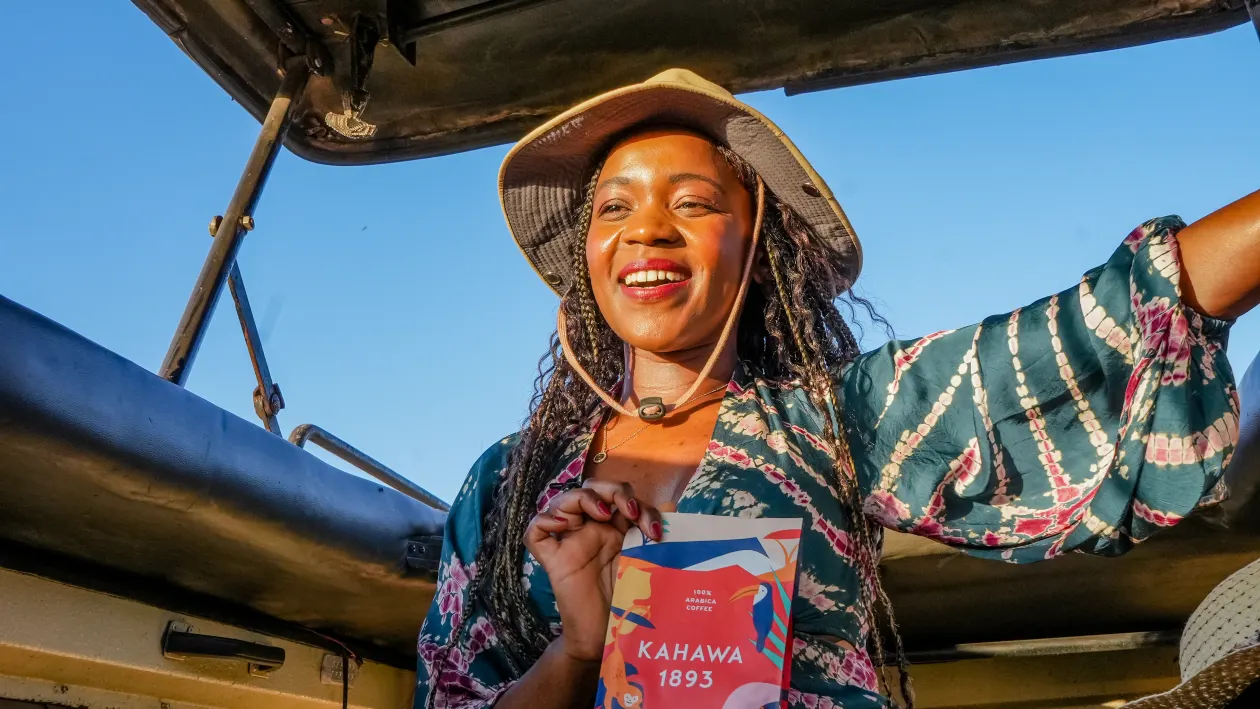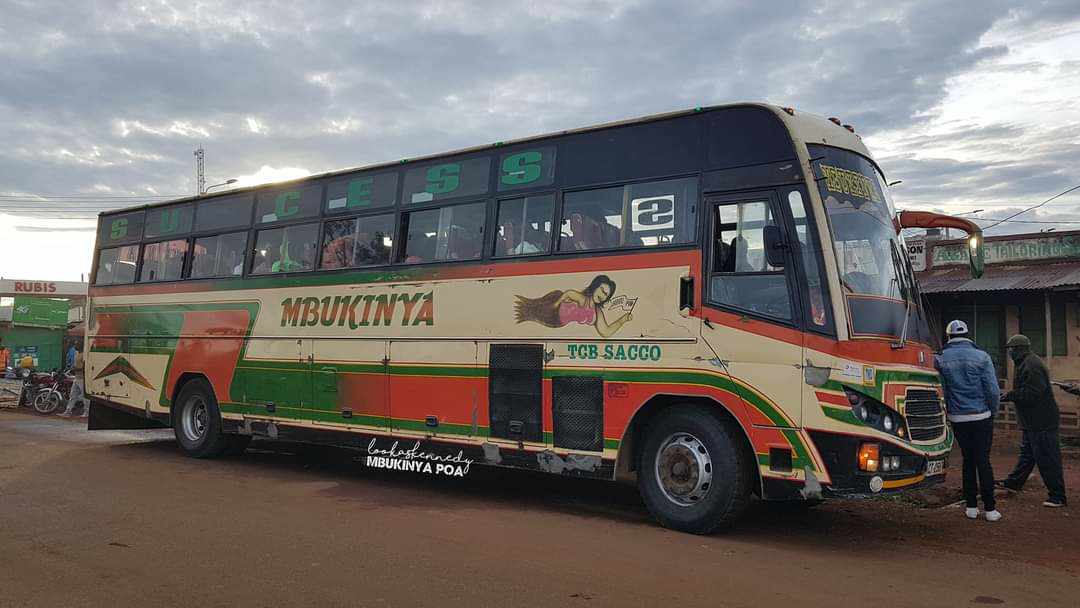The Entrepreneur
Evans Nyagaka Anyona: From Maize Seller to Transport Tycoon
“If you have a vision and you’re willing to work hard for it, nothing can stop you,” Evans Nyagaka says. “I may not have had the best start, but I’ve always believed in my ability to create something meaningful.”

Discover how Evans Nyagaka Anyona, founder of ENA Coach and co-owner of Transline Classic, rose from selling maize to leading Kenya’s transport industry.
By Charles Wachira
In Kenya’s bustling transport industry, few names are as prominent as Evans Nyagaka Anyona, the entrepreneur behind ENA Coach and co-owner of Transline Classic Ltd.
His journey from a maize seller to a transport magnate is a testament to resilience, strategic vision, and the ability to seize opportunities, no matter how dire the circumstances.
Born and raised in Kisii County, Evans’s life was marked by hardship early on.
He lost his father when he was still in Class Six, leaving his mother, a widow, to raise him and his siblings.
Despite the financial struggles, his mother managed to support his education up to the O-level.
However, after Evans scored a D in his Form Four exams,not a very impressive mark and his academic journey came to a halt due to a lack of school fees.
This setback did not deter him. Instead, it became the catalyst that pushed Evans to embrace entrepreneurship.
With limited options, he ventured into selling maize in 1992 during a severe drought that hit Kenya.
The country was reeling from a food shortage, and Evans saw a business opportunity. He purchased maize at KSh 7 per tin and sold it at KSh 35 as the prices surged due to the scarcity, earning him a significant profit.
“I realized that sometimes, the toughest challenges present the best opportunities,” Evans recalls. “That’s how my entrepreneurial journey started.”
With the proceeds from his maize-selling business, Evans opened a small shop, which eventually grew into a wholesale outlet. His ventures were paying off, but his ambitions were far from satisfied.
The Birth of Transline Classic
In the early 2000s, Evans transitioned from retail to public transport. He bought a small pick-up truck, which he modified into a “seven-aside” matatu, where passengers sat facing each other.
The unique design worked well, and his new matatu business quickly gained traction. Soon, he expanded his fleet, purchasing seven more pick-ups before upgrading to Toyota and Nissan matatus, which were more popular and reliable for long-distance travel.
The turning point came in 2005 when Evans co-founded Transline Classic Ltd, a company that initially focused on the Nairobi-Kisii route.
Alongside his business partners, James Bichange and Haron Kamau, Evans took the first major step toward building a transport empire.
They started with three buses, purchased through a loan from Equity Bank, a move that was risky but necessary to scale their operations. The company quickly grew, expanding its fleet and routes as demand for their services soared.
“We saw an opportunity in offering reliable, comfortable, and affordable travel for passengers, especially on the Nairobi-Kisii route, where the demand was growing fast,” says Evans. “It wasn’t easy at first, but with persistence, we began to expand.”
By 2012, Transline Classic had grown its fleet to 24 buses, and today the company boasts over 80 buses and 11-seater shuttles that operate across multiple routes, including Nairobi to Kisii, Kisumu, Eldoret, Busia, Bungoma, and Kitale.
Innovation and Growth
What set Transline Classic apart from its competitors was Evans’s commitment to passenger comfort and modern amenities. The buses were fitted with features that appealed to the modern traveler—TV screens, free Wi-Fi, charging ports at every seat, and entertainment systems—offering an experience that went beyond the traditional matatu service. Evans recognized that by improving the overall experience, he could attract more passengers, and this strategy paid off.
“We wanted to ensure our passengers felt valued. That’s why we invested in providing comfort and services that made their journeys more enjoyable,” Evans explains. “It’s not just about getting someone from point A to point B; it’s about how they feel during that journey.”
The company’s rapid expansion was also driven by its ability to adapt to changing market dynamics. Evans introduced smaller 14-seater matatus and 11-seater shuttles for routes that required less capacity, a move that allowed Transline Classic to tap into underserved areas while maintaining operational efficiency.
ENA Coach: A New Chapter
Following the success of Transline Classic, Evans launched ENA Coach, a new bus company that expanded his footprint in the Kenyan transport sector. ENA Coach became known for its reliable and high-quality services, particularly on long-distance routes. It quickly gained a strong reputation, becoming a go-to option for travelers across the country.
Partnerships and Diversification
Evans’s success story also highlights the power of strategic partnerships. His long-time business associate, James Bichange, brought in matatus that helped form the backbone of their fleet, while Haron Kamau, who later founded Overseas Buses and owns Kamel Park Hotel in Kisii, was also instrumental in the early stages of their business ventures. These collaborations were crucial in establishing a strong foundation for Transline Classic and its subsequent growth.
“I’ve always believed in the strength of partnerships,” says Evans. “Having the right people by your side makes all the difference in business.”
In addition to his transport ventures, Evans has diversified his investments, including interests in real estate and agriculture. His ability to balance multiple businesses while keeping Transline Classic and ENA Coach at the forefront of Kenya’s transport industry has earned him the respect of his peers and made him a role model for young entrepreneurs.
A Legacy of Resilience
Evans Nyagaka Anyona’s journey from selling maize during a drought to becoming one of Kenya’s most successful transport entrepreneurs is a powerful reminder that education, while important, is not the only path to success.
His resilience in the face of adversity, combined with his keen business instincts and willingness to take risks, has built a transport empire that serves thousands of Kenyans daily.
Today, Transline Classic and ENA Coach operate across Kenya, providing jobs for hundreds of drivers, conductors, and support staff. Evans’s story is an inspiration for anyone looking to overcome life’s challenges and build a better future for themselves and their community.
“If you have a vision and you’re willing to work hard for it, nothing can stop you,” Evans says. “I may not have had the best start, but I’ve always believed in my ability to create something meaningful.”
With a fleet of over 80 buses and a growing business empire, Evans Nyagaka Anyona is proof that with determination and strategic thinking, even the most humble beginnings can lead to extraordinary success.
Keywords:Evans Nyagaka Anyona, ENA Coach, Transline Classic, Kenyan transport industry, entrepreneurship in Kenya
The Entrepreneur
Miss Rwanda 2022, Divine Muheto, Faces Drink-Driving Scandal

: Miss Rwanda 2022, Divine Muheto, was arrested for drink-driving, fined, and
detained after a car crash. She expresses regret and seeks forgiveness for her
actions.
From Beauty Queen to Legal Controversy
Divine Muheto, 21, crowned Miss Rwanda 2022, rose to prominence as a symbol of
beauty and ambition. She always believed she had what it took to achieve her childhood
dream of becoming a beauty queen.
Her journey began after high school when she entered the Miss Rwanda competition,
ultimately claiming the coveted title.
Reflecting on her success, she once said, “When you fear, you can’t make anything
different in life, but when you are fearless, a lot of positive things come your way.”
Legal Troubles in 2024
However, her reign as Miss Rwanda has been overshadowed by controversy. In late
2024, Muheto was arrested following a drink-driving incident in Kigali.

Reports from the Rwanda National Police (RNP) confirmed that she was caught driving
under the influence of alcohol without a valid license, resulting in a crash that destroyed
public infrastructure, including a street light pole and palm trees.
The police also noted that Muheto fled the scene of the accident. She was subsequently
fined 190,000 Rwandan francs (approximately $140) and detained.
This incident marked a troubling pattern, as the beauty queen had previously faced
similar charges in September 2023, when she crashed her car into a building while
driving drunk.
Silent Remorse and Public Engagement
Muheto, the daughter of Assistant Commissioner of Police Francis Muheto, has
remained largely silent in the media following her arrest, though her legal team has
expressed that she deeply regrets her actions and has sought forgiveness.
Despite this, she continues to be a public figure, engaged in various activities. Her legal troubleshave raised concerns, but she remains resolute in her belief that life’s challenges present growth opportunities.

Inspirational Messages and Support System
While her parents have largely stayed out of the spotlight, Divine Muheto has continued
to inspire many young people in Rwanda, emphasising resilience and self-improvement.
She once said, “I knew I had what it takes to the last dot,” and even in the face of
adversity, she strives to move forward, learning from her mistakes and striving to make
a positive impact.
She Business
How Margaret Nyamumbo Built Kahawa 1893 from the Ground Up

: Discover Margaret Nyamumbo’s journey from Kenya to the U.S. and how she
built Kahawa 1893 to empower women coffee farmers, achieving business
success and social impact
Early Life and Education: Pursuing Global Opportunities
Margaret Nyamumbo’s entrepreneurial journey began in Kenya, where she grew up on a coffee
farm. However, she moved to the U.S., a decision that significantly shaped her path.
In 2000, she travelled to Smith College, a prestigious liberal arts institution in Massachusetts,
to study economics.
Her desire to study abroad stemmed from the limited educational opportunities available for
women in Kenya at the time. As she later explained, her family encouraged her decision, viewing it as a way to give her the best opportunities for success.

After earning her degree from Smith College, Nyamumbo pursued an MBA at the Wharton
School of the University of Pennsylvania, known for its rigorous business programs.
This solidified her foundation for a future in business, although it was the allure of her roots and a passion for coffee that eventually led her back to entrepreneurship.
From Corporate Work to Entrepreneurship: Embracing Coffee Culture
After completing her studies, Nyamumbo worked in investment banking and consulting, but the world of corporate finance didn’t fully satisfy her ambitions.
It was her return to the coffee industry, deeply connected to her Kenyan heritage, that drove
her entrepreneurial leap. With a vision to support East African coffee farmers, particularly women, Nyamumbo founded Kahawa 1893 in 2018, a coffee brand dedicated to highlighting Kenya’s coffee culture while mpowering local farmers.
The name “Kahawa” is the Swahili word for coffee, while “1893” marks the year when coffee
was first commercially grown in Kenya, grounding her brand in historical significance.
Through Kahawa 1893, Nyamumbo aimed to bring a new approach to the coffee business, one
that not only celebrated East African coffee but also created fair wages for farmers.
Building a Brand with Purpose: Empowering Farmers
Nyamumbo’s vision for Kahawa 1893 went beyond just selling coffee.
She wanted to create a direct impact on the lives of the farmers growing the coffee beans.
The brand’s model incorporated a system where customers could tip the farmers directly via a
QR code found on the coffee bags.
This innovation set the company apart from competitors and positioned it as a socially
responsible business that directly benefited those involved in the production process.
In 2021, Kahawa 1893 hit a major milestone, getting its coffee stocked in Trader Joe’s—the
first Black- and woman-owned coffee brand to be featured there.
This breakthrough moment was significant for Nyamumbo, marking the recognition of her hard work and her commitment to uplifting local farmers.
Overcoming Challenges: What It Takes to Succeed
Despite the challenges of entering a highly competitive market, Nyamumbo’s determination
never wavered. In a 2022 interview with Forbes, she shared her thoughts on what it takes to be a successful entrepreneur.
“You have to be able to take the punches and keep moving,” she said. Her advice reflects the
reality of entrepreneurship: persistence, resilience, and a willingness to learn from failure are
crucial for success.
Nyamumbo also emphasised the importance of passion. “You’ve got to love what you do, or you won’t have the energy to push through the tough times,” she said.
These values have guided her journey, driving Kahawa 1893 to not only succeed but also to
change the way the coffee industry operates, particularly about fair trade and community
empowerment.
The Future of Kahawa 1893: Expanding Horizons
With her success on platforms like Shark Tank and continued global distribution, Nyamumbo’s
Kahawa 1893 is poised for growth.

Her brand continues to expand its reach, and the emphasis on ethical sourcing, community
impact, and high-quality coffee will likely remain at the heart of her business model as she looks to further innovate in the global coffee market.
Through Kahawa 1893, Nyamumbo has shown that business success is not just about
profits—it’s about purpose, people, and passion.
The Entrepreneur
Paul Mburu Muthumbi: Building Kenya’s Mbukinya Bus Empire
Mbukinya faced tough early challenges: stiff competition, unreliable drivers, and high operating costs. Fuel price hikes and maintenance expenses cut into profits, and banks hesitated to fund small, high-risk PSV businesses. ‘There were days I doubted my choice,’ Paul Mburu recalls, ‘but I believed hard work would pay off.’”

Born and raised in Limuru, Kiambu County, Paul Mburu Muthumbi, now 90, has lived a life that exemplifies resilience and determination.
His story is not just one of personal triumph, but also a testament to the power of persistence in the face of adversity.
As a young man, Paul was passionate about the public transport sector, inspired by the buses that passed through his village. “I always knew I wanted to be involved in transport. I just didn’t know how,” he says.
In 1952, after completing his final exams, Paul found himself navigating the difficult job market.
In 1992, armed with little more than determination, Paul began hawking eggs in Nairobi’s busy streets, trying to make ends meet. “I knew that if I worked hard and kept my eyes open for opportunities, I could eventually do better,” he recalls.
It was in these early years of struggling in the informal sector that Paul learned crucial lessons about customer service, managing a small business, and the importance of reinvestment. “I used every penny from selling eggs to save for the next big step,” Paul explains.
Adding, “It wasn’t easy, but I knew that if I worked hard and kept my eyes open for opportunities, I could do better,” he recalls. Over the next 11 years, Paul saved KSh 6,000, which he used to invest in his first bus—a second-hand vehicle that would mark the beginning of his journey in the public transport sector.
The Birth of Mbukinya in 2000
In 2000, after nearly a decade of honing his entrepreneurial skills, Paul saw a potential opportunity in the public transport sector.
Nairobi, the capital city of Kenya, had a growing population, and reliable transportation services were in short supply. Recognizing the gap, he decided to take a bold leap and venture into the PSV industry.
With a small loan from a local microfinance bank, Paul bought his first second-hand bus.
The vehicle cost him KSh 800,000, an amount he managed to secure through a personal guarantee and a strong relationship with the local bank. “I didn’t have much collateral, but my reputation from my small egg business helped me convince the bank to lend me the money,” he says.
Paul registered Mbukinya, a name inspired by his family, and launched the business with a single bus operating on one route in Nairobi.
The early days were tough, with the bus struggling to fill seats and competition from well-established PSV companies. “The first few months were the hardest,” Paul admits.
“The industry was full of players, and many were set in their ways. But I believed in offering better service, and that’s how we started to build our reputation.”
Overcoming Early Challenges
The road ahead was fraught with challenges.
Mbukinya’s initial struggles included fierce competition, unreliable drivers, and high operational costs.
Paul recalls how fuel price fluctuations and maintenance costs often ate into the company’s meagre profits. “There were days when I wondered if I’d made the right choice. But I knew that with consistency and hard work, we could turn things around,” he says.
One of the biggest hurdles Paul faced was a lack of financing to expand his fleet.
In Kenya, many banks are reluctant to lend to new and small businesses, especially in the transport sector, which is viewed as high-risk.
“It was hard to get financial support from banks. They didn’t see the potential in PSV businesses back then,” Paul explains.
However, through persistence, he managed to secure another loan in 2003 from a local bank, this time amounting to KSh 1.5 million (US $.11,27.91).With this loan, he expanded his fleet to three buses.
“The key was to prove that I could repay the loans,” he says. “I made sure that Mbukinya’s buses were always well-maintained and on time. Punctuality became our trademark.”
Building a Reputation and Expanding the Fleet
By 2005, Mbukinya began to gain traction. Paul focused on customer satisfaction, ensuring his buses were clean, his drivers were professional, and the schedules were strictly adhered to.
“A happy passenger is a loyal passenger,” Paul reflects.
This commitment to service quickly paid off, and soon, the buses were consistently full, with more customers opting for his service over competitors.
To further build the company’s reputation, Paul expanded Mbukinya’s services to other major towns in Kenya.
By 2010, the company had expanded its fleet to 10 buses.
He used the profits from his expanding fleet to invest in modernising the buses, replacing older vehicles with newer, more fuel-efficient models. This move helped reduce operational costs, making the business more profitable.
In 2012, Mbukinya hit another milestone when it became one of the first PSV companies in Kenya to introduce an electronic payment system, allowing passengers to pay via mobile money platforms like M-Pesa.
This tech-forward move attracted a new generation of commuters who valued convenience.
Navigating Economic Turmoil and the Role of Banks
As with any business, the road wasn’t always smooth.
In 2015, Kenya’s PSV industry underwent a major regulatory shift. The government introduced new licensing and inspection requirements, which required operators like Paul to invest in fleet upgrades and adhere to stricter safety standards.
“It was a tough time for all of us in the industry,” Paul recalls. “The new regulations meant significant investments in safety equipment and training. But I saw this as an opportunity to differentiate Mbukinya from other operators.”
Despite the financial strain, Paul’s good relationship with banks helped him secure the necessary funding to meet the new regulations.
“The banks saw that we were committed to the business and to complying with regulations. They helped us get through those challenging times,” he says.
In 2018, Paul was able to secure a larger loan to purchase 15 more buses, growing the fleet to over 30 vehicles. His strong ties with financial institutions, built on years of consistent business practices, allowed him to access capital that many of his competitors struggled to obtain.
A Crisis with the Hino Kenya Buses
Despite the steady growth and success, Mbukinya faced a significant setback in 2019. The company had acquired 41 Toyota Hino buses, which had initially seemed like a smart investment.
However, soon after their acquisition, the buses developed severe mechanical problems, causing a major disruption in Mbukinya’s operations. The buses, which were still within their warranty period, posed a serious challenge to the company.
To address the issue, Mbukinya returned the buses to Toyota, who assumed ownership and took on the responsibility of repairing them.
According to Muthumbi, he received KSh 60 million for the buses, but he emphasised that this amount did not fully cover the massive losses the company incurred.
“I had invested billions into those buses, and the repairs took a toll on our finances. It was a huge setback,” Paul explains.
The incident was particularly painful for Mbukinya, as the company had put significant faith in the vehicles, which were expected to bolster the fleet and improve operational efficiency.
The crisis put a strain on Mbukinya’s reputation and finances, requiring both tactical responses and long-term strategy changes.
The Night Ban Controversy
In addition to the challenges with the buses, Paul Mburu Muthumbi also found himself at odds with the National Transport and Safety Authority (NTSA) over the controversial night travel ban.
In December 2013, NTSA introduced a policy restricting public service vehicles from operating between 10 pm and 5 am, citing safety concerns due to accidents during late-night travels.
This decision was met with resistance from several PSV operators, including Muthumbi, who felt that the ban was unfairly detrimental to his business.
“The night ban hit our income hard. Losing those nighttime routes meant a significant drop in revenue,” he explains.
As the chairman of the Kenya Country Bus Owners’ Association (KCBOA), Muthumbi was a vocal critic of the policy.
He even threatened to take legal action to have the ban nullified, arguing that it unfairly affected many small PSV operators who relied on night services to stay competitive.
“We’re being punished for an issue that isn’t fully in our control,” Paul said at the time. “We’ll fight this ban in court if necessary, as it directly threatens our livelihoods.”
These challenges were particularly daunting, but they didn’t deter Muthumbi. Instead, he continued to press forward, proving his resilience in the face of adversity.
His ability to navigate these difficult situations further solidified his reputation as a determined entrepreneur in Kenya’s highly competitive transport sector.
Giving Back and the Road Ahead
Today, Mbukinya operates a fleet of 50 buses, covering multiple routes across Kenya and employing over 200 people.
Paul’s story is a testament to his resilience and vision. Beyond business, he has given back to his community, sponsoring educational programs and offering employment to many young Kenyans.
“I’ve always believed that success isn’t just about making money; it’s about lifting others along the way,” says Paul, who has invested in training programs for his staff and offered financial support to local schools.
Looking to the future, Paul is planning further expansions, with a focus on sustainability.
“I want Mbukinya to be a company that not only leads in transport but also sets the standard for environmental responsibility. We’re looking into green technologies like electric buses in the next five years,” he says.
From hawking eggs to running a transport empire, Paul Mburu Muthumbi’s story shows that with vision, resilience, and a willingness to embrace change, success is always within reach.
-

 Business & Money8 months ago
Business & Money8 months agoEquity Group Announces Kshs 15.1 Billion Dividend Amid Strong Performance
-

 Politics2 months ago
Politics2 months agoFred Okengo Matiang’i vs. President William Ruto: A 2027 Election Showdown
-

 Politics2 months ago
Politics2 months agoIchung’wah Faces Mt. Kenya Backlash Over Gachagua Impeachment Support
-

 Politics4 months ago
Politics4 months agoPresident Ruto’s Bold Cabinet Dismissal Sparks Hope for Change
-

 Politics5 months ago
Politics5 months agoKenya Grapples with Investor Confidence Crisis Amid Tax Protest Fallout
-

 Politics5 months ago
Politics5 months agoPresident Ruto’s Lavish Spending Amid Kenya’s Economic Struggles Sparks Outrage
-

 Politics3 months ago
Politics3 months agoJohn Mbadi Takes Over Kenya’s Treasury: Challenges Ahead
-

 Business & Money1 week ago
Business & Money1 week agoMeet Kariuki Ngari: Standard Chartered Bank’s new CEO of Africa. What’s Next?





